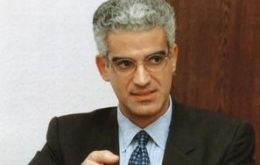MercoPress. South Atlantic News Agency
Tag: Brazilean economy
-
Wednesday, August 7th 2013 - 17:49 UTC
Brazil’s Dilma celebrates decline in food prices reflected in ‘contained’ inflation

The first decline in food prices in two years provided temporary assistance to Brazilian President Dilma Rousseff’s efforts to tame inflation. Prices as measured by the benchmark IPCA index rose 0.03% in July and more encouraging with prospects for prices to remain unchanged.
-
Wednesday, July 3rd 2013 - 04:43 UTC
Brazil's Rousseff pushes political reform to quell discontent

President Dilma Rousseff sent Congress reform proposals on Tuesday intended to make Brazilian politics more representative in a bid to recoup popularity she lost in a wave of angry protests against the country's political establishment.
-
Friday, June 14th 2013 - 23:17 UTC
Brazil pumps more consumer credit lines trying to bolster the economy

The administration of President Dilma Rousseff will hand out 17 billion Reais (8 bn dollars) in cheap loans for home appliance purchases it was announced this week, a further attempt bolster Brazilians' buying power as an anemic economy and high inflation erode its approval rating.
-
Tuesday, March 5th 2013 - 05:18 UTC
Brazil’s “competitiveness cliff” and commodities dependency exposed in World Bank report

Brazil is not only the biggest country in Latinamerica but also has the largest economy and expects to play a leading role in the global economy in the near future, however a report from the World Bank is not so enthusiastic and points out to a series of challenges the country must address if it wishes to effectively become a super star.
-
Wednesday, December 5th 2012 - 18:45 UTC
Brazil extends tax breaks to construction industry to spur growth

The Brazilian government extended tax breaks to the country's construction industry in a new effort to encourage investment and boost flagging growth which is putting pressure on the government to further include other stimuli measures.
-
Wednesday, September 5th 2012 - 01:07 UTC
President Rousseff hints to further stimuli measures for manufacturing sector

Brazilian president Dilma Rousseff said her government would continue with the policy of reducing labour costs to favour companies and improve their competitiveness and hinted that new initiatives referred to power costs for industry could be in the pipeline.
-
Thursday, August 2nd 2012 - 07:20 UTC
IMF praise for Brazil’s financial system but warns of home-grown risks

Thanks to sound policies and built-in cushions, Brazil’s financial system weathered the global crisis that began in 2008 remarkably well, but now policymakers need to monitor for signs of home-grown financial trouble, the IMF said in its later report.
